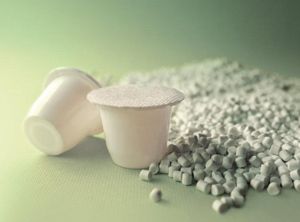API
Biodegradable bioplastics for single-serve coffee capsules launched
Applicazioni Plastiche Industriali (API, Mussolente / Italy; www.apiplastic.com), a producer of thermoplastic elastomeric compounds, is launching new grades of biodegradable and compostable bioplastics. This broadens its portfolio of "Apinat" bioplastics for single-serve coffee capsules to meet growing consumer demand for compostable coffee capsules. The new Apinat grades, which include TPE-E and TPC thermoplastic elastomers, have a renewable-sourced content of between 60% to more than 90%. The bioplastics comply with US Food and Drug Administration and EU food contact regulations, and they are suitable for both injection moulding and continuous compression moulding.
 API wants to set new milestones in the coffee capsules market with its bio-compounds (Photo: API) |
Apinat bioplastics offer exceptional mechanical and thermal characteristics during the brewing process and can easily substitute conventional plastics. Apinat series products conform to biodegradability standards of the association European Bioplastics and the scientifically recognised standards, EU 13432/EN 14995 and US ASTM D6400, for the biodegradability and compostability of plastic products.
"Consumers are increasingly looking for eco-friendly solutions for their coffee machines," said business unit manager Aldo Zanetti. "This innovation around Apinat bioplastics reinforces API’s commitment to sustainability and environmental responsibility, offering coffee in compostable coffee capsules."
In 2016, the industry produced more than 35 bn non-recyclable plastic coffee capsules worldwide. Experts expect an increase of 17 bn plastic capsules by the end of 2020, API said.
In addition to bioplastics, API produces TPEs, TPUs, EVA and PVC compounds as well as masterbatches for numerous industrial and consumer applications. API was acquired by Trinseo (Berwyn, Pennsylvania / USA; www.trinseo.com) in July 2017 – see Plasteurope.com of 13.07.2017.
"Consumers are increasingly looking for eco-friendly solutions for their coffee machines," said business unit manager Aldo Zanetti. "This innovation around Apinat bioplastics reinforces API’s commitment to sustainability and environmental responsibility, offering coffee in compostable coffee capsules."
In 2016, the industry produced more than 35 bn non-recyclable plastic coffee capsules worldwide. Experts expect an increase of 17 bn plastic capsules by the end of 2020, API said.
In addition to bioplastics, API produces TPEs, TPUs, EVA and PVC compounds as well as masterbatches for numerous industrial and consumer applications. API was acquired by Trinseo (Berwyn, Pennsylvania / USA; www.trinseo.com) in July 2017 – see Plasteurope.com of 13.07.2017.
02.11.2017 Plasteurope.com [238157-0]
Published on 02.11.2017

 German version of this article...
German version of this article...